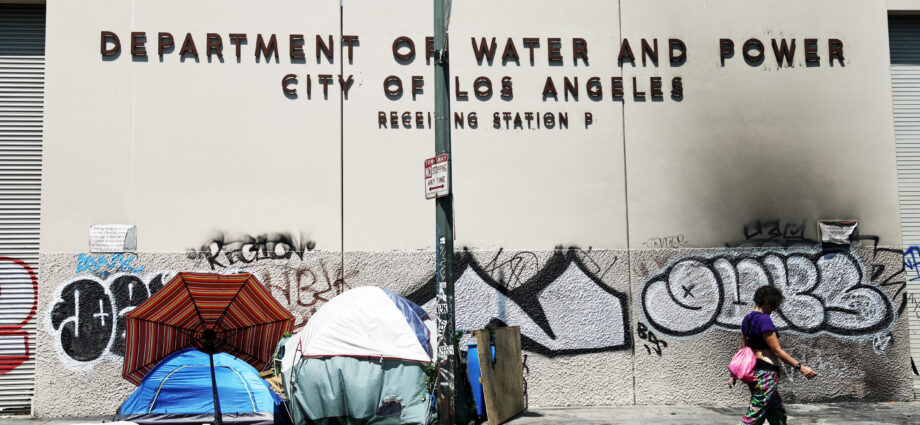The prospect of a United States TikTok ban has led to a slew of social media content attacking American politics and policy, with American and Chinese social media users reportedly sharing critical posts.
One viral post claiming that the “Chinese people are learning that we fine the homeless people” was viewed 6.5 million times on Thursday, as TikTok faces exodus from U.S. app stores by Sunday.
“I REPEAT, THEY HAVE LEARNED THE UNITED STATES FINES HOMELESS PEOPLE FOR BEING HOMELESS,” it added.
A bipartisan law banning TikTok was passed by Congress and signed into law by President Joe Biden last year. On Friday, the Supreme Court ruled unanimously to uphold the federal law, banning TikTok unless its China-based parent company, ByteDance, divest its U.S. operations by Sunday.
Officials in Washington say TikTok’s ownership by ByteDance leaves it vulnerable to exploitation by the Chinese Communist Party, putting the security and privacy of Americans at risk.
In the commentary surrounding the ban, social media users began posting screengrabs and other content, which was said to have been shared on RedNote and TikTok, taking a critical look at U.S. politics and values.
The post about the U.S. fining its homeless struck a chord with millions of viewers online, although the story behind the claim deserves some background.

Mario Tama/Getty Images
As previously reported by Newsweek, homelessness surged 18 percent last year in the U.S., with 770,000 people experiencing homelessness on a single night in 2024.
Research from the U.S. Department of Housing and Urban Development (HUD) said the record-breaking figure meant roughly 23 of every 10,000 Americans shared this experience.
Stretched homelessness services, a national affordable housing crisis, inflation, stagnant wages and systemic racism were identified as some of the causes.
With numbers rising, some cities are embracing a forceful approach, enforcing bans on homeless camping and pursuing fines, prompted by a recent Supreme Court ruling.
In late June 2024, the court issued a 6-3 ruling in City of Grants Pass, Oregon, v. Gloria Johnson. Johnson argued that the city of roughly 40,000 unlawfully punished homeless people for sleeping on the streets when no other shelter was available and unlawfully banned the use of sleeping bags, blankets, pillows, and even cardboard boxes in public spaces.
The court sided with the Oregon city over Johnson, finding that penalizing homeless people for sleeping on the streets does not violate the Eighth Amendment, which prohibits cruel and unusual punishments as well as “excessive fines.”
A ruling from the 9th Circuit Court of Appeals, which has jurisdiction over Alaska, Arizona, California, Hawaii, Idaho, Montana, Nevada, Oregon and Washington, had held since 2018 that a ban violated the Eighth Amendment where there weren’t enough shelter beds.
NPR reported in December 2024 that more than 100 cities banned homeless camping around the country last year, with enforcement that included fines of $1,000 and jail time. The National Homeless Law Center told States Newsroom in November 2024 that 99 ordinances were passed in 26 states restricting people from sleeping and camping, with another 66 pending.
Politicians such as California Governor Gavin Newsom have directed state agencies to remove encampments, buoyed by the Supreme Court ruling.
Newsom pledged last year to start taking away state funding from cities and counties that were not doing enough to get people experiencing homelessness out of encampments and into shelters. California holds roughly one-third of the nation’s population of people experiencing homelessness.
Newsom and fellow Californian leaders, such as San Francisco Mayor London Breed, have argued that previous court rulings prevent elected officials from addressing matters of public safety.
What’s Next For TikTok?
The conversation criticizing American politics sprang up amid the looming TikTok ban. While the ban received bipartisan support and Supreme Court backing, President-elect Donald Trump has expressed his desire to keep the app available in the U.S., although details of his plan aren’t clear.
Trump-Vance transition team spokeswoman Karoline Leavitt told Newsweek that the president-elect remains committed to saving TikTok. “There’s no better dealmaker than President Trump,” Leavitt said in a statement.
The Chinese-owned video-sharing app RedNote, known as Xiaohongshu in China, has skyrocketed in popularity amid the TikTok ban. Experts speaking to Newsweek suggest it may also pose national security risks, which triggered Congress to act on TikTok in 2024.

